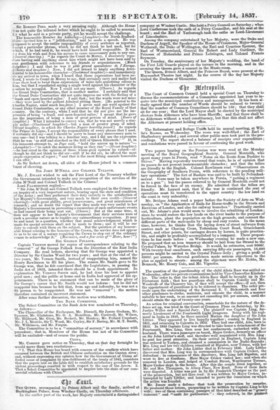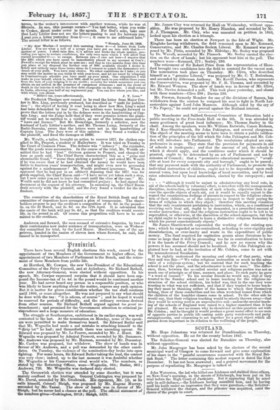Yilttrupatto.
The Court of Common Council held a special Court on Thursday to discuss the recommendations of a Committee appointed last year to inquire into the municipal constitution and management. It has been already agreed that the number of Wards should be reduced to twenty ; that the number of Common Councilmen should be 150; that they shall sit for one year ; that the Lord Mayor shall be elected by the municipal electors from Aldermen who have been Sheriffs; and that there shall be no Alderman without a ward constituency, but that this shall not affect the Aldermen at present holding office.
The Reformatory and Refuge Unioli held its annual meeting, at Willis's Rooms, on Wednesday. The room was well-filled ; the Earl of Shaftesbury presided ; and several other public men took part in the proceedings. The report showed a balance of receipts over expenditure ; and resolutions were passed in favour of continuing the good work.
Two papers bearing on the Persian war were read at the Monday meeting of the Royal Geographical Society. General Monteith, who spent many years in Persia, read "Notes on the Route from Bushire to Shiraz." Having repeatedly traversed that route, he is of opinion that its passes do not present insurmountable obstacles ; and that the tribes are friendly to the English. Colonel Rawlinson read "Observations on the Geography of Southern Persia, with reference to the pending military operations." The fort of Bushire was said to be built by Nebuchadnezzar. Guns may be taken anywhere in Persia, "putting a regiment on to a gun" ; but the passes referred to by General Monteith could not be forced in the face of an enemy. He admitted that the tribes are friendly. Mr. Layard said, that if the war is continued the seat of operations must be transferred to the upper country : the low land on the coast is very unhealthy.
Mr. Bridges Adams read a paper before the Society of Arts on Wednesday, on the Application of Rails for Horse-traffic in the Streets and Environs of London and also for railway branches." Practically carried out, Mr. Adams's dim would seem to involve the rebuilding of London ; since he would restore the low lands on the river banks to the purpose of horticulture, plant the population on the high grounds, and connect the different parts of the metropolis by cheap and easy routes. In the mean time however, he thinks that the laying down of street railways from centres such as Charing Cross, Tottenham Court Road, Gracechurch Street, and other points, for carriages drawn by horses, is quite practicable, and might be profitably accomplished by a company. These propositions he has made before : on Wednesday evening he made a new one. He proposed that an iron tramway should be laid from the Strand to the Crystal Palace, by Waterloo Bridge. It would, he estimates, cost 9600/. With twenty-four omnibuses, each carrying fifty-six passengers, 16,000 persons might be carried to the Crystal Palace daily ; giving a profit of 8900/. per annum. Several gentlemen made serious objections to the plan as applied to streets : among the objectors were Mr. Hobbs, Mr. Bennock, Mx. Henry Cole, and Mr. Vignoles.
The question of the guardianship of the child Alicia Race was settled on Wednesday, after two private examinations held by Vice-Chancellor %Indereley. The order is, that the infant Alicia Race Khali be brought up in the Protestant faith; that her guardians shall be Captain Conolly and Mr. Woodroffe of the Chancery bar, if they will accept the office—if not, then the appointment of guardians is to be referred to chambers. The order proceeds upon the undertaking of the Reverend E. U. Bickersteth and four other gentlemen to clothe, maintain, and educate the child, in a manner suitable to her rank, to an amount not exceeding 25/. per annum, until she should attain the age of twenty-one years.
An action for criminal conversation, remarkable for the nature of the defence set up, was tried in the Court of' Common Pleas on Saturday, by Mr. Justice Willes and a Special Jury. The plaintiff was Captain Ling, formerly Lieutenant of the Fourteenth Light Dragoons. Being with Ins regiment in India in 1849, he there married Marian the daughter of Sir John Littler. They appeared to live happily together ; coming to England in 1851, and returning to Calcutta in 1853. They had one child, Ada, born in 1853. In 1856 Captain Ling was directed to take home a detachment of the Fourteenth. Mrs. Ling, then near her confinement, embarked with her husband. There was a passenger on board, Major Croker, formerly an officer on Sir John Littler's staff; and therefore well acquainted with Mrs. Ling : he paid her great attention. On their arrival in England, Captain Ling was ordered to Turkey, and obtained a commission in the lashi-Bazouks ; Mrs. Ling and her two children remained at Bigadon, near Totnes, with her father said mother. Sir John Littler died in February 1856. Lady 'Littler discovered that Mrs. Ling was in correspondence with Captain Croker, the defendant : in consequence-of this discovery, Mrs. Ling left Bigadon, and went to live at Corsham. Here Major Croker visited her; and when she removed to London, and lodged at Conduit Street, Westbourne Terrace, Major Croker slept in the house. After this the couple lived together, as Mr. and Mrs. Thompson, in AlLsop Place, New Road. None of these facts were disputed. A letter was put in by dm Frederick Thesiger on the part of the prosecution, but not then read : it was written by Major Croker, intercepted by Lady Littler, and intended to prove the connexion on which the action was founded.
Mr. James made a defence that took the prosecution by surprise. He produced three letters,. purporting to be written by Captain Ling to his vile; two of them conteming passages of that kind described as "grossly indecent" and "unfit for publication " : they referred, in the plainest
terms, to the writer's intercourse with another woman, while he was at Hhumla. In one, this passage occurs—" You had better, when you write to Croker, direct under cover to the agents. For God's sake, take care that Lady Littler does not see the letters passing to and fro between you. I sent you a letter yesterday from Cl—; it came to me addressed here." The second letter is as follows.
"My dear Marian—I received this morning those d—d letters from Lady Littler. You see what a hell of a scrape you have got me into with that b— mother of yours. I shall take Mrs. C.'s advice and burke the whole matter, , providing you agree to certain conditions, the only ones upon which I will allow that cursed scoundrel C— to escape. Between you—I care not how—I require that the 250/. which you have spent be immediately placed to my account at Cox's ; Powell's receipt for which must be sent me ; and that in two months from this time you place at my disposal the further sum of 300/. available should I desire it. Solely and entirely upon these terms alone do I consent to quash the damnatory evidence of your guilt. You have your choice. No other conditions do I take; so you may settle the matter as you think fit with your lover, and let me know by telegraph to Constantinople whether you have made up your mind. One stipulation I will make in your behalf, which is, that 150/. shall be paid back to you within three years from the date of your lodging it to my credit; security for wluch assurance you can obtain on my arrival in the presence of competent witnesses • and in the event of death in the interim it will be the first debt chargeable on the estate. I shall return to India, allowing you half of my regimental pay. You can live where you like, and with whom you please.
"Believe me, yours affectionately, J. T. LING."
Sir Frederick Thesiger now caused to be read the letter from Major Conker to Mrs. Ling, previously produced, but described as "unfit for publicsstun"; the object of having it read being to show how Mrs. Ling's mind had been debauched by her lover. Two soldiers were brought forward to prove that the letters put in by the defence were in the handwriting of Captain Ling ; and the Judge held that if they were genuine letters the plaintiff would not be entitled to a verdict,. as one of the letters amounted to "leave and licence." But Mr. Bremndge, formerly a solicitor, now the husband of Lady Littler's mother, and Mr. Thomas Laing, formerly of the Bashi-Bazouks, swore that the letters were not in the handwriting of Captain Ling. The Jury were of this opinion : they found a verdict for the plaintiff, and fixed the damages at 10001.
Mr. Woulfe, a tailor, brought an action to recover 107/. for clothes supplied to Mr, Propert, a student of Haileybury. It was tried on Tuesday in the Court of Common Pleas. The defence was " infancy" _the rejoinder, that the goods were necessaries. In the course of the trial, Mr. Woulfe admitted that he had " lent " thirteen guineas to Propert, and charged the loan as goods sold. The Chief Baron characterized this as a "gross and abominable fraud," "worse than picking a pocket " ; and asked Mr. Woulfe if he was aware that if he had obtained the money he would have been liable to fourteen years' transportation, and might even now be proceeded against for a misdemeanour ? Mr. Woulfe professed ignorance. When it appeared that he had put in an affidavit deposing that the 107/. was for goods supplied, the Chief Baron said—" I have never yet taken such a step, but I now order you not to leave the court until the close af the case." Mr. Woulfe said he did not know he had committed perjury ; he had signed the document at the request of his attorney. In annulling up, the Chief Baron dealt severely with the plaintiff, and the Jury found a verdict for the defendant.
The committee of the shareholders of the Royal British Bank and the committee of depositors have arranged a plan of compromise. The shareholders propose to pay the creditors a composition of 68. ed, in the pound— Ss. on the 2d March and 3s. 6d. on the 17th April. It is calculated that the assets of the batik will pay 9s. 6d., BO that the creditors would receive 168. in the pound in all. Of course this proposition will have to be submitted to the creditors.
Anderson and Saward, the men accused of extensive forgeries, by two of their confederates now under sentence of transportation, were on Wednesday committed for trial, by the Lord Mayor. Hardwicke, one of the approvers, handed in the names of eleven men whom Seward, he said, had caused to be transported.



























 Previous page
Previous page